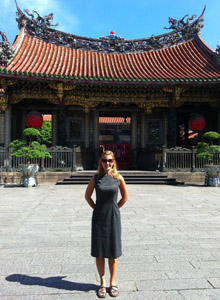Gabel Working To Improve Forensic Science
"We're all familiar with the phrase 'no two fingerprints are alike.' But there's actually no science to back up this assumption," says Jessica Gabel, Assistant Professor of Law, who has taken her research interests in forensic evidence abroad.
From Poland to Taiwan to Australia, she has been giving lectures, meeting with government officials and collecting and presenting research on ways in which the international community can work together to improve forensic science.
"Forensic science suffers from a standardization deficiency; right now, it is more art than science," she says.
Using her B.S. in forensic science and experience as a special deputy public defender, Gabel has been on the forefront of calling for reforms to the use of forensic evidence in criminal cases. "Unlike DNA," she says, "there's no biology, chemistry or physics that provides a scientific basis for the opinions that are used to win convictions."
 Faulty forensics has played a significant role in wrongful convictions-an area in which Gabel has worked extensively. She co-founded the Wrongful Convictions Project at the University of Miami School of Law, now an Innocence Clinic, and she continues to be involved with wrongful conviction cases.
Faulty forensics has played a significant role in wrongful convictions-an area in which Gabel has worked extensively. She co-founded the Wrongful Convictions Project at the University of Miami School of Law, now an Innocence Clinic, and she continues to be involved with wrongful conviction cases.
"It's not just that bad science is getting into court; the real problem is that it is convicting innocent people, and it's incredibly difficult to undo a conviction, no matter how blameless your client is."
As Gabel sees it, wrongful convictions need to be prevented not cured. "Forensic evidence should be reliable from the outset, but it's not a cheap endeavor. It takes time, resources, dollars, and, in my opinion, a federal watchdog," she says.
So Gabel has taken her cause international. "Police departments around the world appreciate that some areas of forensic science are lacking, but they all face the same budget constraints."
She proposes that nations share the burden of forensic research and development. "We need international cooperation and collaboration to do the studies, build the statistics and make forensics a consistent and dependable tool in a criminal prosecution," Gabel says.
Over the summer, Gabel lectured at the University of Warsaw in Poland and met with various law enforcement officials about doing just that. In September, she was part of Young Scholars delegation visiting Taiwan, where she met with government officials to discuss cooperation agreements in research. She also addressed the International Symposium on Forensic Sciences in Tasmania.
Gabel says, "recognition of forensic science's shortcomings has been long overdue. Moreover, meaningful change takes time and money, and that's not the nature of the criminal justice system."